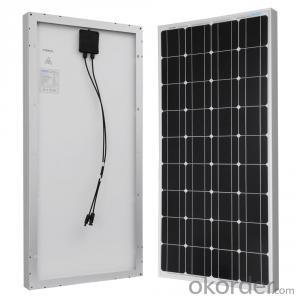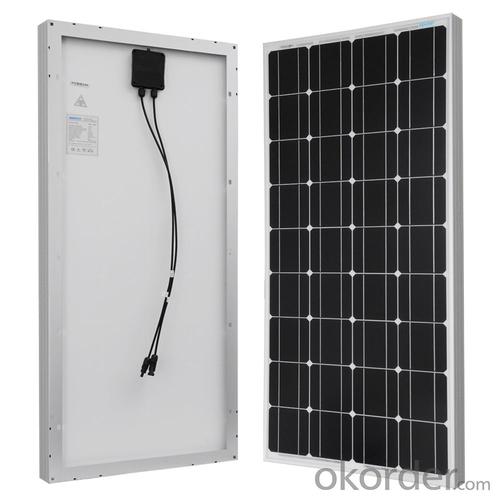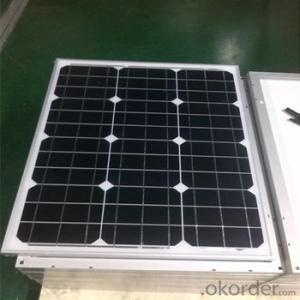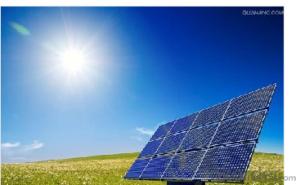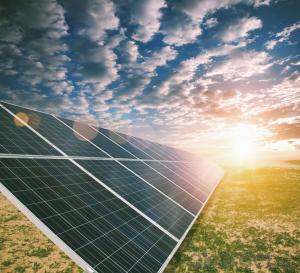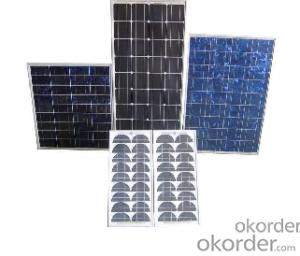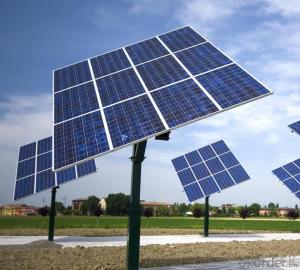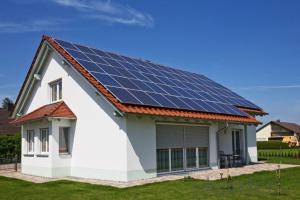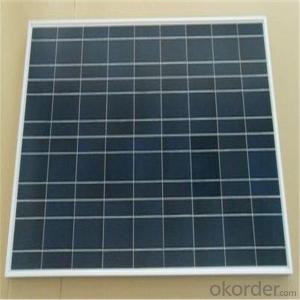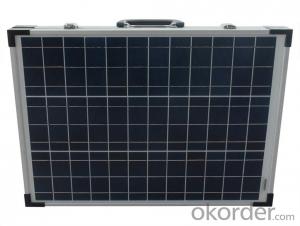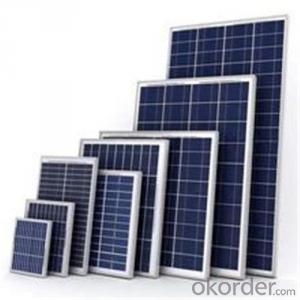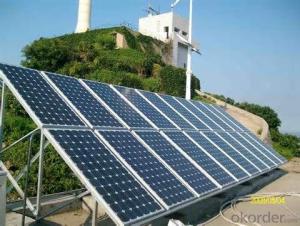330W High Efficiency Poly Solar Module with 100w Output
- Loading Port:
- Tianjin
- Payment Terms:
- TT OR LC
- Min Order Qty:
- 1 watt
- Supply Capability:
- 100000 watt/month
OKorder Service Pledge
OKorder Financial Service
You Might Also Like
Specification
Product Description:
1.Structure of Solar Module Description
CNBM Solar's photovoltaic module is designed for designed for large electrical power requirement. It is the optimal choice for both on-grid and off-grid power systems. CNBM Solar offers high performance of power per square foot of solar array.
2.Main Features of the Solar Module
Solar Cell: High efficency crystalline solar cell. Even if under the weak light, the solar module can produce maximum power output.
Tempered glass: Anti-reflecting coating and high transmission rate glass increase the power output and mechanical strength of solar module.
EVA and TPT: Using high quality EVA and TPT to prevent destroying and water.
Strong aluminum frames to strengthen the load hold and to stand against high wind.
Junction box: Multi function junction box with water proof.
Long lifetime: ≥25 years; Less power decrease.
Good performance of preventing from atrocious weather such as wind and hails.
Resisting moisture and etching effectively, not effected by geology.
The certificate issued by international authority: UL, TUV, IEC, VDE, CE.
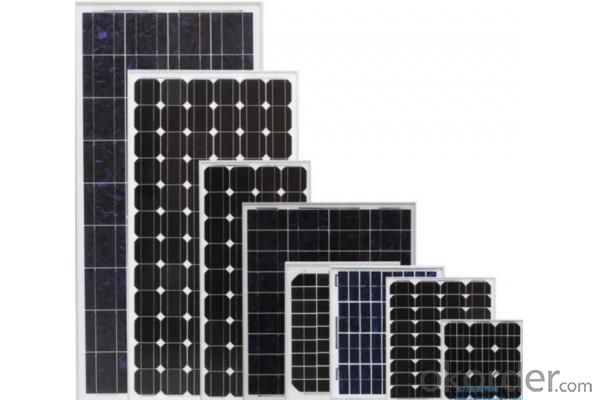
Solar panel working process
In addition to being the ultimate source of all life on earth, the sun is an infinitely renewable, completely pollution-free source of electricity. Instead of burning fossil fuels dug up from the ground in a big power plant – a very 19th century, industrial age approach, when you think about it – solar panels convert sunlight directly into electricity, with no harmful emissions.
The basic unit of a solar panel is a solar cell, which usually consists of one or two layers of silicon-based semiconductor wafers. When struck by the photons in sunlight, the solar cell generates an electrical charge due to the "photovoltaic effect" – which is a pretty good name, since it produces voltage from photons. The flow of these electrons moves in a steady electrical current from one side of the cell to the other.
Dozens of these PV cells are packaged together into solar modules, which in turn are packaged into solar panels that are mounted on a rooftop and arranged to maximize their hours of exposure to direct sunlight. Because the electricity generated by all those solar cells is direct current (DC), it is then sent to an inverter that transforms the power into the same alternating current (AC) used by the appliances in your home and the local utility electricity distribution grid. Increasingly, these inverters are getting "smart," providing data monitoring for solar installation performance and other grid integration services.
- Q: in a solar panel, i know that the electrons are knocked loose and used as energy, what happens to the protons?
- silicon based photovoltaic cells used some boron as dopant. i dont understand if that helps supress proton pastime, the way they be conscious boron on supressing run away nuclear reaction.... im clueless as you
- Q: Rooftop solar panel (not sure if rubber or plastic?) has leak arising from thin vertical crack in panel about long. Any ideas for repair?Thanks.
- This Site Might Help You. RE: rooftop pool solar panel leaks? Rooftop solar panel (not sure if rubber or plastic?) has leak arising from thin vertical crack in panel about long. Any ideas for repair? Thanks.
- Q: What is the impact of snow accumulation on solar panels' performance?
- Snow accumulation on solar panels can significantly reduce their performance. The layer of snow acts as a barrier, preventing sunlight from reaching the panels and reducing their ability to generate electricity. Additionally, the weight of the snow can cause structural damage to the panels if not properly cleared, potentially leading to long-term issues. Therefore, it is important to remove snow from solar panels to ensure optimal performance and longevity.
- Q: Can solar panels be used in areas with extreme temperatures?
- Yes, solar panels can be used in areas with extreme temperatures. While extreme heat can reduce the efficiency of solar panels, modern solar technologies are designed to withstand high temperatures. Similarly, solar panels can also operate in extremely cold temperatures, although their performance may be slightly affected. Overall, solar panels can still generate electricity effectively in areas with extreme temperatures.
- Q: When I make a solar panel, what do I use to store the energy. For example I am going to make a solar panel to power my lights in my room. But I dont want the lights only to come on when the sun is out because that would be very pointless. So... Do I use the panels to charge something like a car battery and then run wires from the battery to an extension chord which will go to a surge protector? It sounds awesome, but I have to put it all together. The help is very appreciated. Thank you guys.
- First of all you seem to be talking about making a solar photovoltaic panel instead of a solar thermal panel. Most solar panels will produce DC electricity. Your house uses AC electricity. You can set up the solar photovoltaic panels to send their current to charge a battery bank and then you can tap into that battery bank and send the power to a voltage inverter to change the power to AC. The better inverters will do a better job of this. The system has to be matched and sized properly. If you are not familiar with electrical work you should have someone who is more knowledgeable help or do the work. Good luck with your project.
- Q: I contend:As far as the solar panels causing global warming I'll try to explain. If you put a black panel on the ground or on your house and don't connect it to anything, it will absorb solar energy (heat) during daylight and release it at night (radiation). The net heat gain is zero. If you hook up a solar panel in the same place but hook it up to batteries, charge the batteries during sunlight hours and using that energy to electrically heat the home at night. The panels will absorb solar energy during the day but will convert that to electrical energy in the batteries instead of radiating it back into space at night. The result is a net gain in earth's temperature.Right or wrong?
- Third Law of Thermodynamics (in normal speak): “Not only can you never get ahead, you can’t even break even.” This is a truism that applies to all activities involving energy exchange (and almost everything else as well). Energy in the form of solar radiation falls on the earth. That energy is absorbed by the planet (everything) and heat results. Some portion of that energy is lost in the absorption process and the net released as heat is less than that absorbed from the sun. This is true in all cases. Solar panels, both photovoltaic and heat collectors are subject to the Third Law and they all lose some of the radiant energy striking them in the process of converting that energy into either hot water (or whatever fluid) or electrical energy. Regardless of the process there is always a net loss of energy. The time delay you mention has no bearing on the total heat gain or loss for the planet. In fact the “solar panel effect” reduces the net energy put back into the ecosystem because it introduces another iteration of energy loss through conversion. The Holy Grail of energy conservation it the ability to use, store or recover the entire amount of energy produced regardless of the source of that energy, burning hydrocarbons, geothermal heat exchange, solar radiation, mice on treadmills …..all forms of energy suffer a net loss in any exchange! If we could avoid that loss we could dramatically reduce the heat lost into the atmosphere or ground water and our net energy gain would also be dramatic! Check out the super cooled circuits in use to reduce resistance in sophisticated electronic equipment for a good example of the energy savings. (Of course the savings do not account for energy lost in the cooling process. In any event NO….. solar panels do not contribute to global warming via their operation. (Their manufacture is another story altogether!)
- Q: Are there any fire hazards associated with solar panels?
- Yes, there are potential fire hazards associated with solar panels, although they are relatively rare. These hazards can occur due to faulty installation, wiring issues, or manufacturing defects. However, with proper installation, regular maintenance, and adherence to safety regulations, the risk of fire can be minimized.
- Q: How do solar panels affect the property's overall sustainability?
- Solar panels can greatly enhance a property's overall sustainability by generating clean and renewable energy from the sun. By reducing reliance on fossil fuels and lowering carbon emissions, solar panels contribute to a greener environment. Additionally, solar energy can help reduce electricity bills and provide a reliable and independent source of power, making the property more self-sufficient and resilient.
- Q: Can solar panels be damaged by hail or strong winds?
- Yes, solar panels can be damaged by hail or strong winds. Hail can cause physical damage to the panels, such as cracking or shattering the glass surface. Strong winds can potentially dislodge or loosen the panels, leading to structural damage or detachment. To mitigate these risks, solar panels are designed and installed to withstand certain weather conditions, but extreme hail or exceptionally strong winds can still cause damage.
- Q: That one costs money but looks like it might work. I don't really have the money for it but if it works then it would probably be worth it. Do homemade solar panels really work or is it just a gimmick? I'm really interested to see if anyone has actually tried this and to see what they say about it.Thanks
- Yes there are plans and testimonials all over the internet and dozens of vids on youtube for homemade panels
Send your message to us
330W High Efficiency Poly Solar Module with 100w Output
- Loading Port:
- Tianjin
- Payment Terms:
- TT OR LC
- Min Order Qty:
- 1 watt
- Supply Capability:
- 100000 watt/month
OKorder Service Pledge
OKorder Financial Service
Similar products
Hot products
Hot Searches
Related keywords
